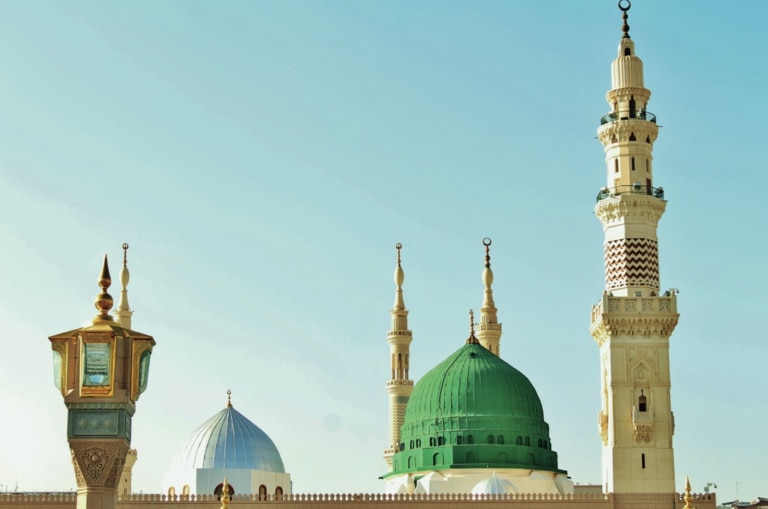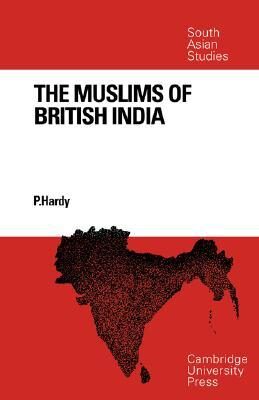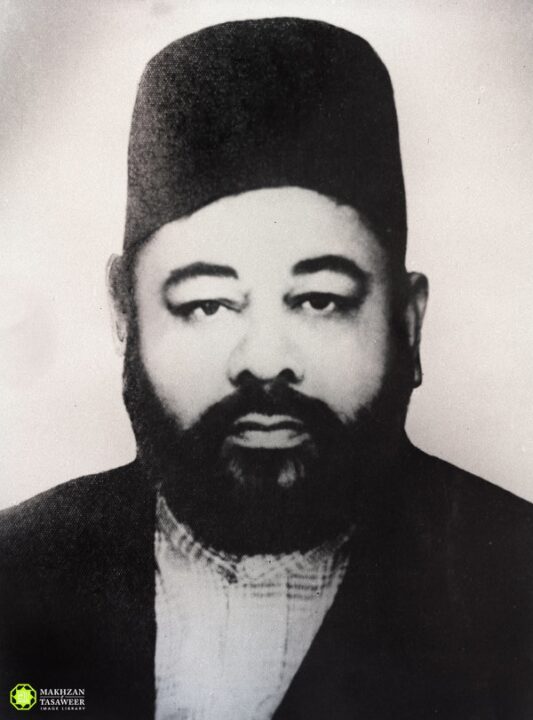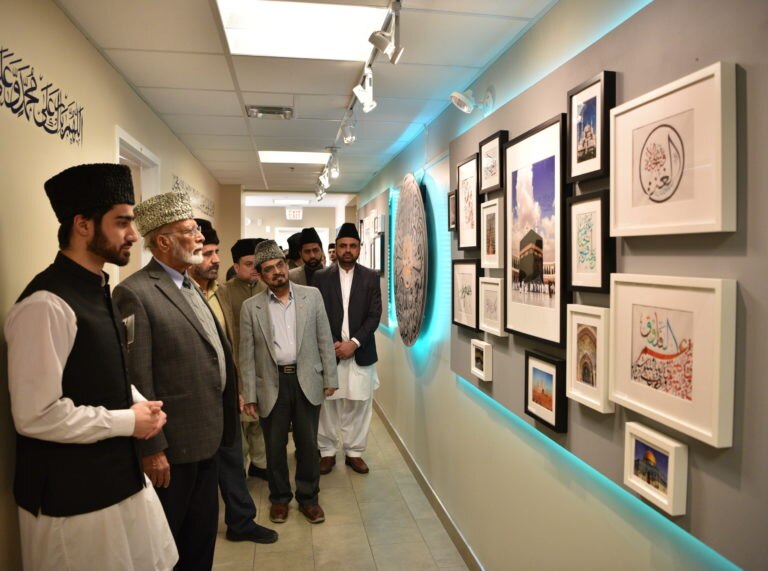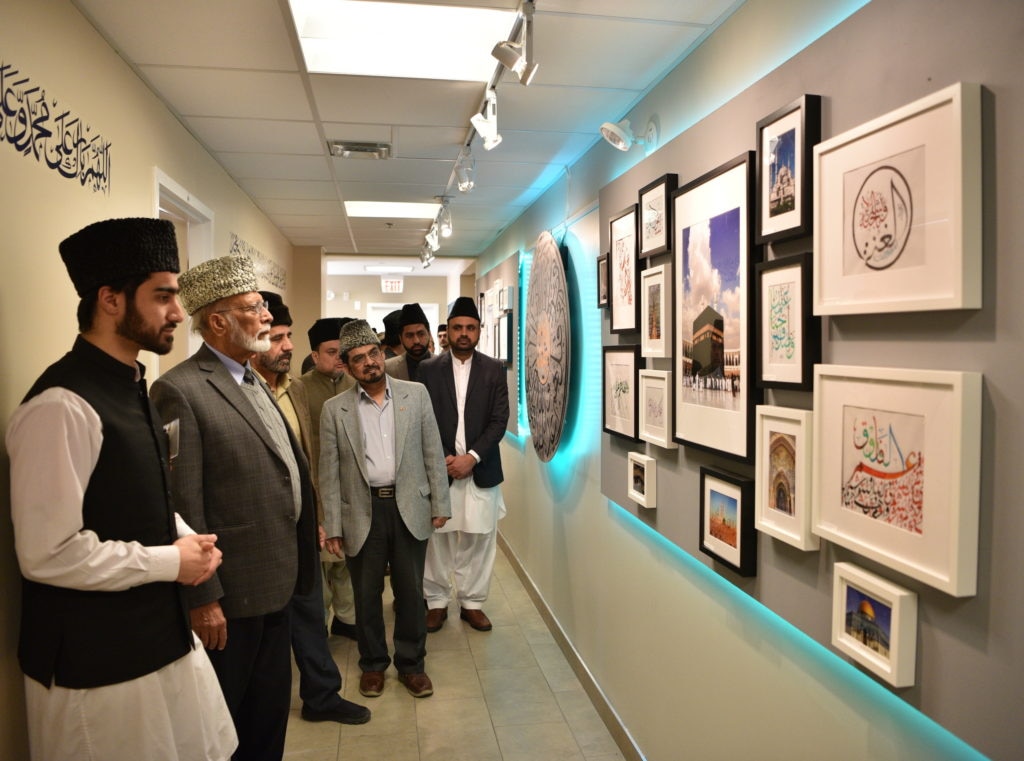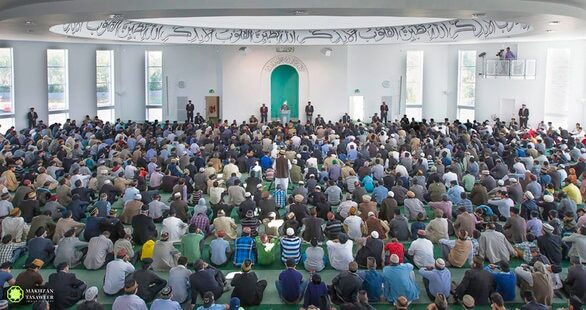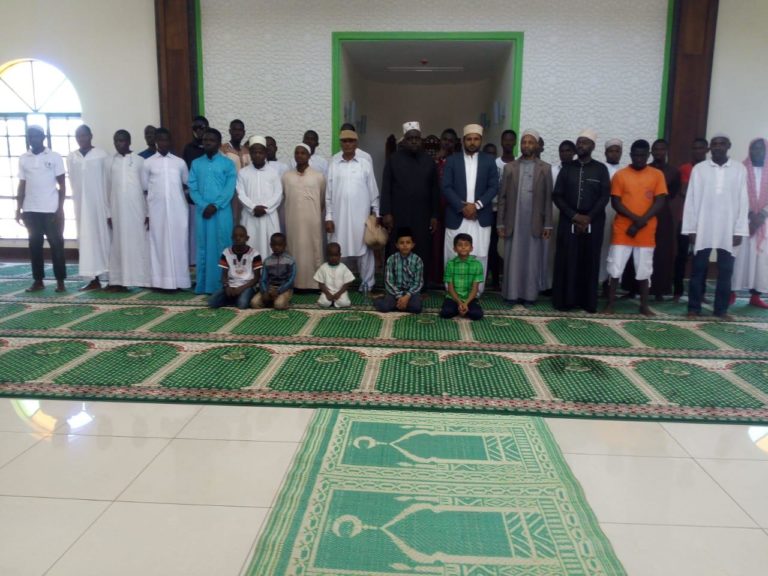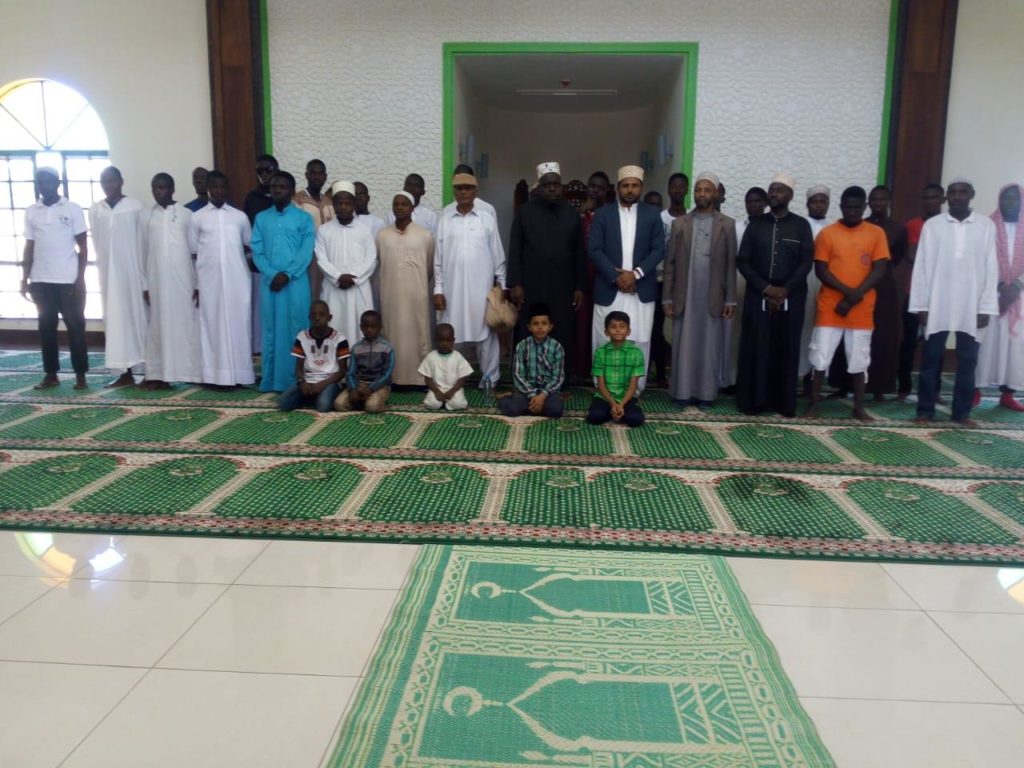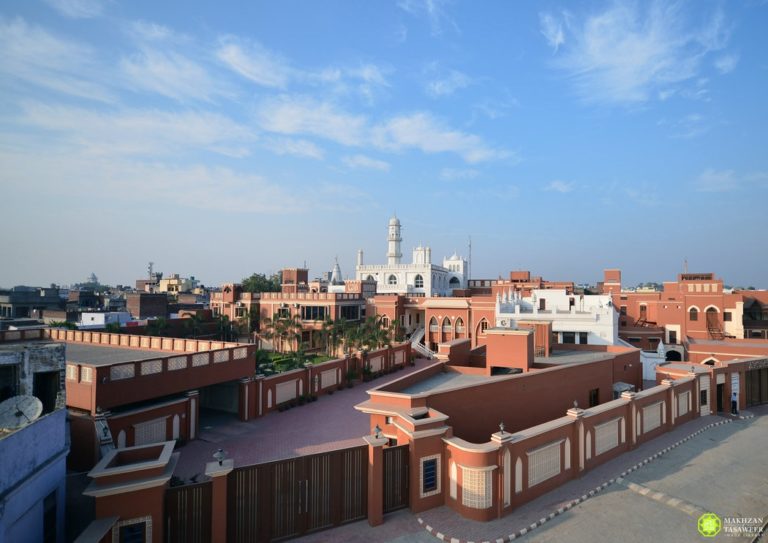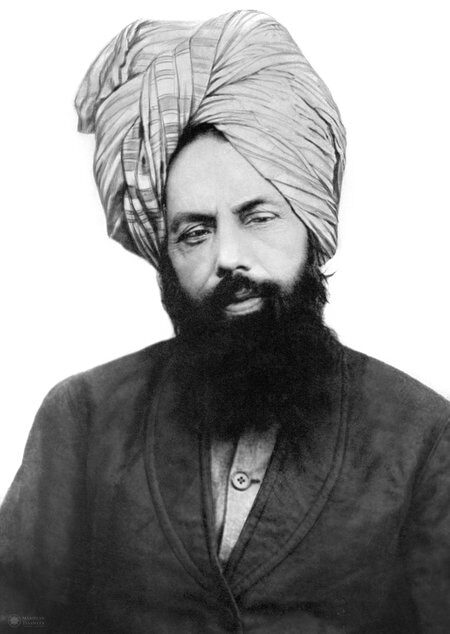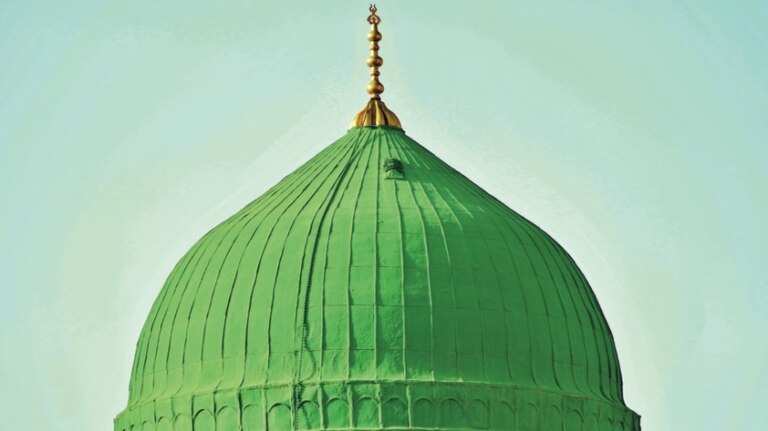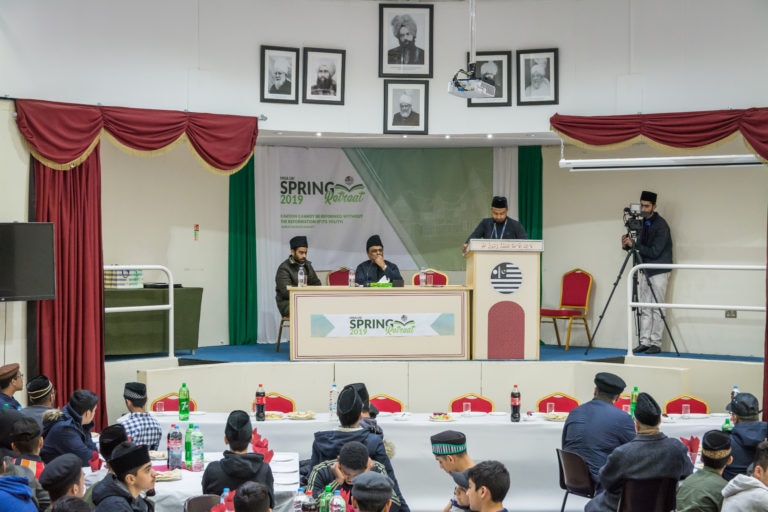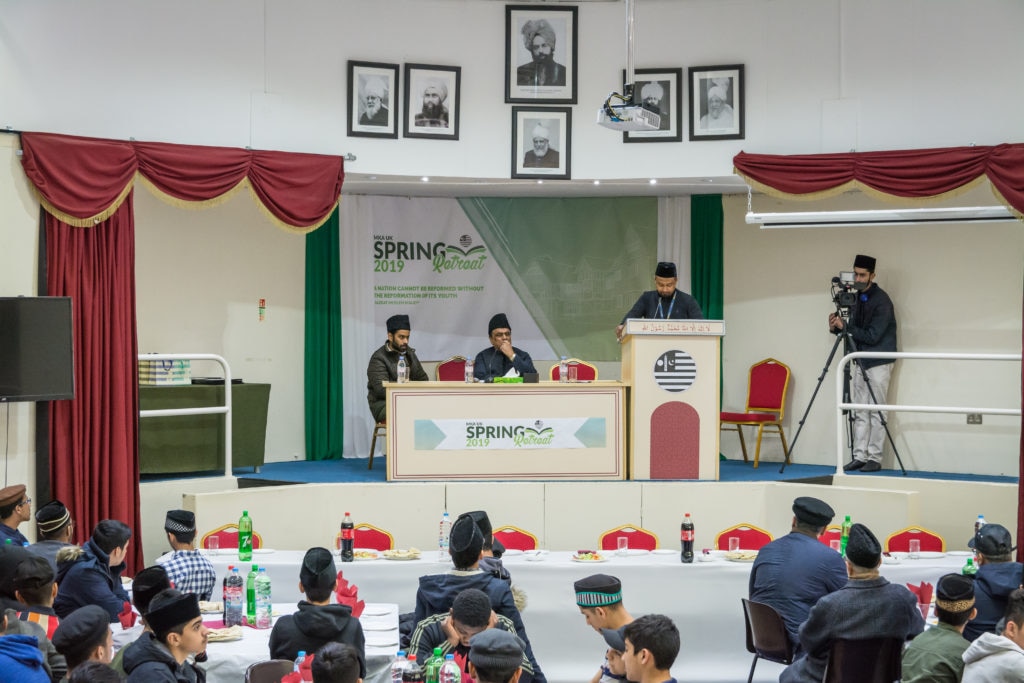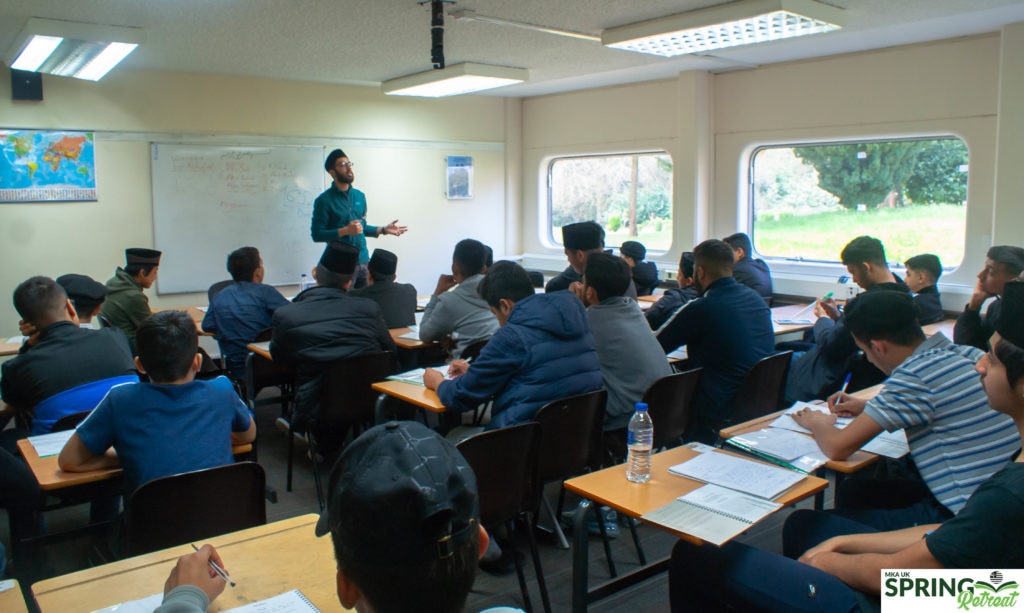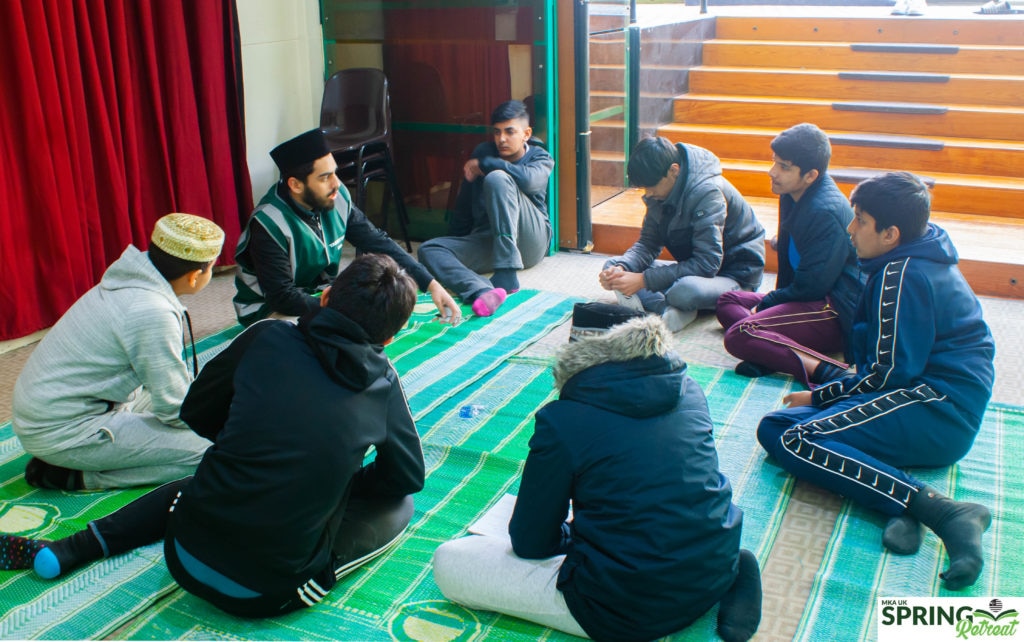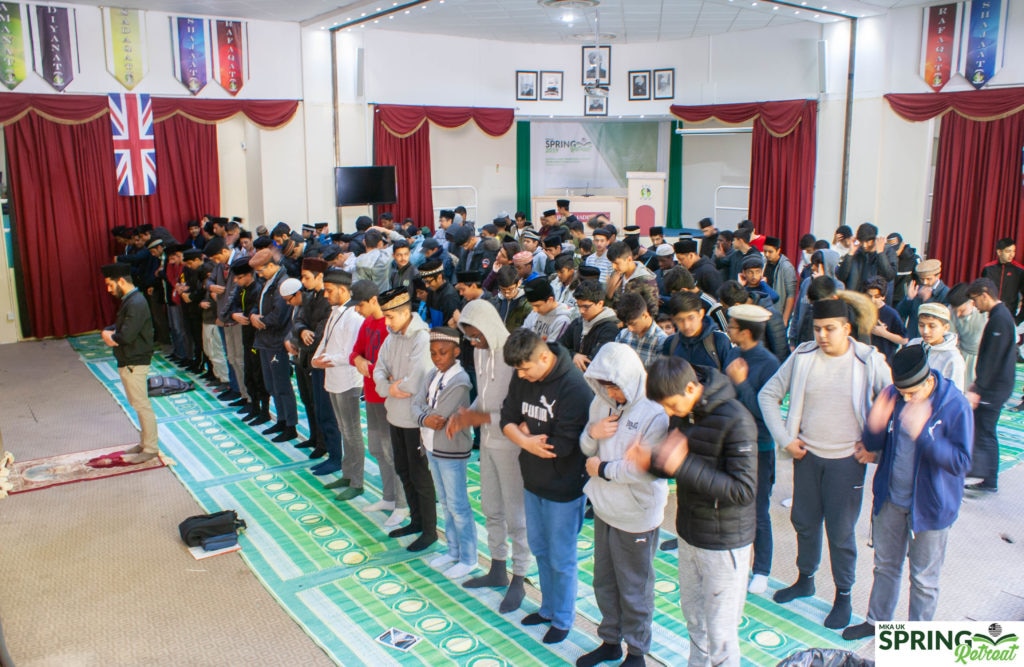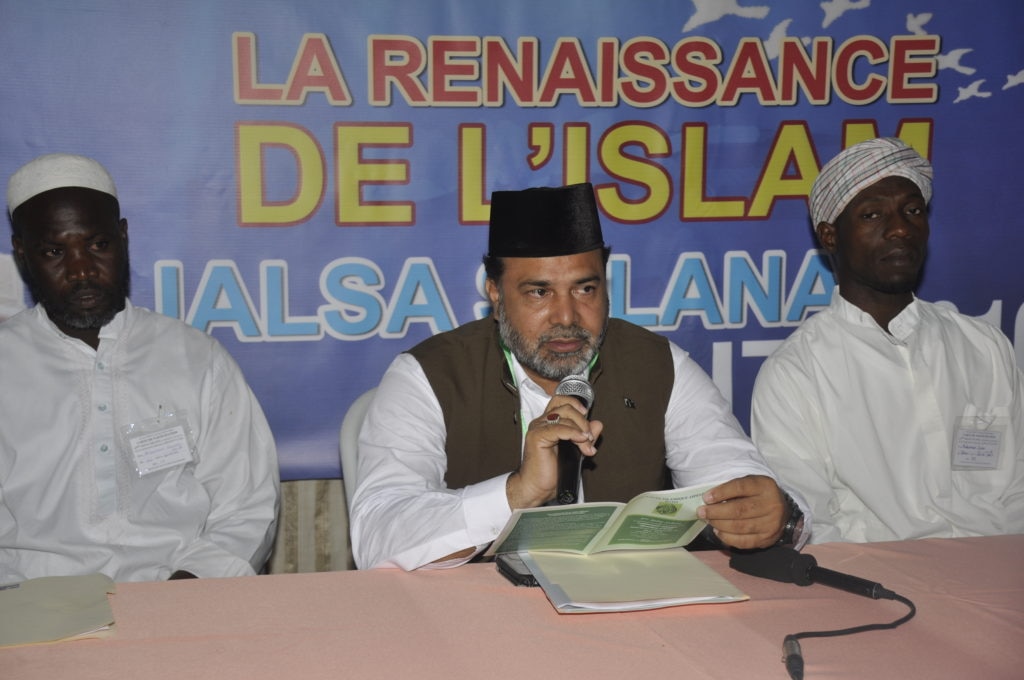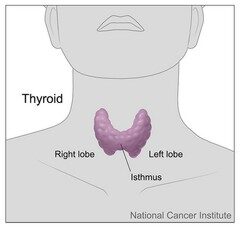Friday Sermon
29 March 2019
Delivered from Baitul Futuh Mosque
Men of Excellence
After reciting the Tashahud, Ta‘awuz, and Surah al-Fatihah, Hazrat Khalifatul Masih Vaa stated:
The first of the Badri Companionsra
whom I shall mention today is Hazrat Tulaibra bin Umair. His title
was Abu Adi. His mother’s name was Arwah, who was the daughter of Abdul
Muttalib and hence was the paternal aunt of the Holy Prophetsa. As I
mentioned, his title was Abu Adi and he was one of the earliest converts to
Islam and accepted Islam while the Holy Prophetsa was at
Dar-e-Arqam. (Usdul Ghaba, Vol. 3, p. 93, Tulaib bin Umair, Dar-ul-Kutb
Ilmiyyah, Beirut, 2003)
Abu Salama bin Abdur Rahman narrates
that Hazrat Tulaibra bin Umair accepted Islam at Dar-e-Arqam. After
this he went to his mother and informed her that he had become a follower of
the Holy Prophet Muhammadsa and believed in Allah, the Lord of all
the worlds. His mother replied, “Your maternal cousins are indeed more
deserving of your help and cooperation than anyone else”, i.e. referring to the
Holy Prophetsa and praised her son for having accepted the Holy
Prophetsa.
She then said, “By God, had we women
had the same strength as men, we would also have certainly followed, supported
and defended him.” Hazrat Tulaibra replied to his mother saying, “If
these are your sentiments, why do you then not accept Islam and follow the Holy
Prophetsa? Your brother Hamza has already accepted Islam.” She
replied, “Let me first assess the reaction of my sisters. Then, I will join him
as well.”
Hazrat Tulaibra narrates
that, “I said to her, ‘I implore you in Allah’s name, please go to the Holy
Prophetsa, greet him, accept him and give this testimony that there
is none worthy of worship except Allah and that Muhammadsa is the
Messenger of Allah.’ Upon this she said, ‘I also testify that there is none
worthy of worship expect Allah and Muhammadsa is the messenger of
Allah.’” After that she used to defend the Holy Prophetsa by
way of her speech and also used to urge her son to help and show obedience to
the Holy Prophetsa. (Al-Mustadrak Ala Al-Sahihain, Vol. 3, p.
266, Kitab-ul-Marifat Al-Sahaba, Tulaib bin Umair, Hadith no. 5047, Dar-ul-Kutb
Ilmiyyah, Beirut, 2002)
It is narrated regarding Hazrat Tulaibra
that he was the first person in Islam to have inflicted an injury on an
idolater because he insulted the Holy Prophetsa. The details of this
incident are as follows:
Once, Auf bin Sabrah Sahmi was
insulting the Holy Prophetsa, when Hazrat Tulaibra picked
up a camel’s jawbone and injured him by hitting him with it. Someone complained
to his mother, Arwah, saying, “Have you not seen what your son has done?” She
replied:
اِنَّ طُلَيْبًا نَصَرَ ابْنَ خَالِهٖ
وَاسَاهُ فِي ذِي دَمِهٖ وَمَالِهٖ
Meaning, “Tulaib has simply come to the
aid of his maternal cousin. He has shown sympathy to him with his blood and his
property.”
According to some sources, the name of
the individual whom he hit was Abu Ihaab bin Aziz Darmi. According to other
narrations, the person whom Hazrat Tulaibra injured was either Abu
Lahab or Abu Jahl. According to one narration, when someone complained to his
mother regarding his attack, she replied, “The best day in the life of Tulaib
is one in which he defends his maternal cousin – i.e. the Holy Prophetsa
– who has come with the truth from God Almighty.” ((Al-Asaba Fi Tameez
Al-Sahaba, Vol. 3, p. 439, Tulaib bin Umair, Dar-ul-Kutb Al-Ilimiyya,
Beirut, 1995) (Al-Mustadrak Al’a Al-Sahihain, Vol. 4, p. 57, Kitab-ul-Marifat
Al-Sahaba, Arwah bint Abdul Muttalib, Hadith no. 6868, Dar-ul-Kutb Ilmiyyah,
Beirut, 2002)
Hazrat Tulaibra was among
those Muslims who migrated to Abyssinia. However, when the rumour reached
Abyssinia that the Quraish had accepted Islam, some Muslims returned to Mecca
and Hazrat Tulaibra was also among them. (Sirat ibn Hisham,
p. 169, Dar ibn Hazam, Beirut, 2009)
As has been mentioned previously,
according to Hazrat Mirza Bashir Ahmadra there are some historians,
not all, who believe that it was not long after the Muslims had migrated to
Abyssinia that a rumour spread that the entire Quraish had entered the fold of
Islam and that Mecca had become absolutely peaceful for Muslims. Hence, some
people immediately returned, without investigating the matter. Only upon
returning did they realise that the news was false. I have already mentioned
the details of this in the sermons a few weeks ago. Nevertheless, when they
returned and realised the true reality, some sought the protection of the
chiefs of Mecca and others returned when they came to know of the truth, as it
was a complete fabrication. I have previously already mentioned the reason why
this rumour was spread, therefore there is no need to mention it again on this
occasion.
Nevertheless, the companions returned
as the cruelties afflicted by the Quraish increased by the day. Furthermore,
according to the instruction of the Holy Prophetsa, other Muslims
were also migrating gradually and in secrecy. It is said that the number of
people that migrated to Abyssinia reached 101, which included 18 women. Only a
few Muslims remained with the Holy Prophetsa. The return to
Abyssinia, as well as the migration of other Muslims during this period, is
referred to by the historians as the second migration to Abyssinia. (Sirat
Khatamun-Nabiyyin, Hazrat Mirza Bashir Ahmadra, p. 147,
149)
When Hazrat Tulaibra
migrated from Mecca to Medina, he stayed with Hazrat Abdullah bin Salama
Ajlani. The Holy Prophetsa formed a bond of brotherhood between
Hazrat Tulaibra and Hazrat Munzir bin Amrra. Hazrat
Tulaibra participated in the battle of Badr and he is counted
amongst the prominent companions of the Holy Prophetsa. He
participated in the Battle of Ajnadain, which took place in 13 AH in the month
of Jumadi-ul-Ula. He attained martyrdom during this very battle at the age of
35.
Ajnadain is an area located in Syria,
where Muslims and the Byzantines fought in 13 AH. However, according to some
sources, he was martyred during the Battle of Yarmouk. (Al-Tabqaat-ul-Kubra
li ibn Sa‘d, Vol. 3, p. 91, Tulaib bin Umair, Dar-ul-Kutb al-Ilimiyya,
Beirut, 1990) (Usdul Ghaba, Vol. 3, p. 94, Tulaib bin Umair, Dar-ul-Kutb
Ilmiyyah, Beirut, 2003) (Mujam-ul-Buldan, Vol. 1, p. 129, Ajnadain,
Dar-ul-Kutb Ilmiyyah, Beirut).
The next companion to be mentioned is
Hazrat Salim Maula Abi Huzaifara. His title was Abu Abdullah and his
father’s name was Ma‘qil. As I mentioned, the name of Hazrat Salim’s father was
Ma‘qil. He lived in an area called Istakhr, which is situated in Iran. He is
counted among the prominent companions of the Holy Prophetsa and he
was also among the Muhajireen [Muslims who migrated from Mecca to Medina]. He
migrated to Medina prior to the Holy Prophet’ssa migration. The Holy
Prophetsa formed a bond of brotherhood between Hazrat Salim and Muaz
bin Maidh. (Usdul Ghaba, Vol. 2, pp. 382-383, Salim Maula Abi Huzaifa,
Dar-ul-Kutb Ilmiyyah, Beirut, 2003).
Hazrat Salimra was the slave
of Thubaita bint Ya‘ar, the wife of Hazrat Abu Huzaifara. In those
days, regarding the slaves, there was a general rule that if a slave was
released and passed away, then his wealth would be inherited by the owner who
freed the slave. However, a sa‘iba was a slave that was freed by their
master for the sake of God Almighty and thus, the person who freed him no
longer had any right over their wealth after he passed away. Hazrat Salimra
was also freed as a sa‘iba. Thereafter, Hazrat Abu Huzaifara
took Hazrat Salimra as his adopted son. Thus, he was also known as Salim
bin Abi Huzaifa. Hazrat Abu Huzaifara wedded him to his niece,
Fatima bint Waleed. (Al-Tabqaat-ul-Kubra li ibn Sa‘d, Vol. 3, p. 63,
Salim Maula Abu Huzaifa, Dar-ul-Kutb al-Ilimiyya, Beirut, 1990) (Al-Mustadrak
Al’a Al-Sahihain [translation], Vol. 4, p. 434 footnote, Ishtiaq. A.
Mushtaq Printers, Lahore, 2012)
God Almighty revealed the following
verse:
اُدۡعُوۡهُمۡ لِاٰبَآئِهِمۡ هُوَ اَقۡسَطُ عِنۡدَ اللّٰهِۚ فَاِنۡ لَّمۡ تَعۡلَمُوۡۤا اٰبَآءَهُمۡ فَاِخۡوَانُكُمۡ فِي الدِّيۡنِ وَ مَوَالِيۡكُمۡ ؕ وَ لَيۡسَ عَلَيۡكُمۡ جُنَاحٌ فِيۡمَاۤ اَخۡطَاۡتُمۡ بِهٖ ۙ وَ لٰكِنۡ مَّا تَعَمّدَتۡ قُلُوۡبُكُمۡ ؕ وَ كَانَ اللّٰهُ غَفُوۡرًا رَّحِيۡمًا
The translation is as follows:
“Call them by the names
of their fathers. That is more equitable in the sight of Allah. But if
you know not their fathers, then they are your brothers in faith and your
friends. And there is no blame on you in any mistake you may unintentionally make
in this matter, but what matters is that which
your hearts intend. And Allah is Most Forgiving, Merciful.” (Surah al-Ahzab,
Ch.33: V.6)
After the revelation of this verse,
Hazrat Salimra became known as “Maula Abu Huzaifa” i.e. the freed
slave of Abu Huzaifa. Initially, when he was set free, he was known as the son
of Abu Huzaifa, but later, he was referred to as a freed slave or friend of Abu
Huzaifara.
Muhammad bin Jafar narrates, “When
Hazrat Abu Huzaifara and Hazrat Salim Maula Abi Huzaifara
migrated from Mecca to Medina, they both stayed at the residence of Hazrat
Abbad bin Bishrra.” (Al-Tabqaat-ul-Kubra li ibn Sa‘d, Vol. 3,
p. 62, Abu Huzaifa bin Utbah, Dar-ul-Kutb al-Ilimiyya, Beirut, 1990)
Hazrat ibn Umarra narrates
that when the initial Muhajireen arrived from Mecca, they resided in a
place called Usbah which is situated near Quba. Hazrat Salimra would
lead them in prayers because he was the one who had the most knowledge of the
Holy Quran out of all the others. (Al-Tabqaat-ul-Kubra li ibn Sa‘d, Vol.
3, p. 64, Salim Maula Abu Huzaifa, Dar-ul-Kutb al-Ilimiyya, Beirut, 1990),
Masud bin Hunaidah narrates, “When we
resided in Quba in the company of the Messenger of Allahsa, we saw a
mosque there in which the companions would offer prayers while facing Baitul
Maqdas and Hazrat Salim Maulah Abu Huzaifara would lead them in
prayer. (Al-Tabqaat-ul-Kubra li ibn Sa‘d, Vol. 4, p. 233, Dar-ul-Kutb
al-Ilimiyya, Beirut, 1990)
Hazrat Salimra was a qari
of the Holy Quran. He was amongst the four companions about whom the Holy
Prophetsa had stated that one should learn the Quran from them. (Usdul
Ghaba, Vol. 2, p. 382, Salim Maula bin Abi Huzaifah, Dar-ul-Kutb Ilmiyyah,
Beirut, 2003)
Hazrat Mirza Bashir Ahmad Sahibra
writes, “Then, there were many freed slaves who attained a lofty rank in their
knowledge and wisdom. As such, Salim bin Ma‘qil, the freed slave of Abu Huzaifara,
was considered to be one of the most distinct scholars from among the
companions. Moreover, Salim was also from among the four companions who were
appointed by the Holy Prophetsa to teach the Holy Quran. (Sirat
Khatamun-Nabiyyin, Hazrat Mirza Bashir Ahmadra, p. 399)
Further relating regarding him, Hazrat
Mirza Bashir Ahmad Sahibra writes, “Then, there was Salim bin Ma‘qil
… who was an ordinary freed slave of Abu Huzaifara bin Utbah.
However, he progressed in his knowledge and wisdom to the extent that he was
among the four companions who were appointed among the Muslims by the Holy
Prophetsa to teach the Holy Quran and were deemed worthy enough to
be his representatives in this respect.” (Sirat Khatamun-Nabiyyin, Hazrat
Mirza Bashir Ahmadra, p. 403)
According to another narration, the
Messenger of Allahsa stated that one should learn the Quran from
four companions: Hazrat Abdullahra bin Masud, Hazrat Salim Maulah
Abu Huzaifara, Hazrat Ubbayra bin Kaab and Hazrat Muaz
bin Jabalra. (Sahih Bukhari, Kitab Fazail-ul-Sahaab-ulNabi,
Munaaqib Salim Maula Abi Huzaifah, Hadith no. 3758)
In one of the traditions it states that
once Hazrat Aishara arrived a little late to see the Holy Prophetsa.
The Holy Prophetsa asked her why she was late, and she replied, “A qari
was reciting the Holy Quran in the most beautiful manner. I began listening to
his recitation of the Quran, and thus got late.” The Holy Prophetsa
put on his cloak and went outside and saw that it was Hazrat Salimra
who had been reciting the Holy Quran. Upon seeing this, the Prophetsa
proclaimed, “I thank God Almighty, Who has granted my people such a beautiful qari
as yourself.” (Usdul Ghaba, Vol. 2, p. 383, Salim Maula Abi Huzaifah,
Dar-ul-Kutb Ilmiyyah, Beirut, 2003)
On the occasion of Uhud, when the Holy
Prophetsa was injured, it was Hazrat Salimra who had the
honour of washing his wounds. Qatadah relates that on the day of the Battle of
Uhud, the Holy Prophet’ssa blessed forehead and teeth (between his
front and canine teeth) sustained injuries. Hazrat Salim Maula Abu Huzaifah was
washing the Prophet’s wounds while the Prophetsa was saying, “How
can a nation who has dealt so cruelly with its Prophet ever be successful?”
On this occasion, the following verse
was revealed:
لَيۡسَ لَكَ مِنَ الۡاَمۡرِ شَيۡءٌ اَوۡ يَتُوۡبَ عَلَيۡهِمۡ اَوۡ يُعَذِّبَهُمۡ فَاِنَّهُمۡ ظٰلِمُوۡنَ
Meaning, “Thou hast no concern in the
matter: He may turn to them in mercy or punish them, for they are wrongdoers.”
[Surah Al-e-Imran, Ch.3: V.129]
Hazrat Salimra relates that
the Holy Prophetsa said, “On the Day of Judgement, a particular
group of people shall be summoned” (this is something worth listening to very
carefully), “who shall have virtues equal to mountains of Tihamah.” Tihamah is
a mountain range in a region of uneven terrain off the coast of the Arab
peninsula which begins from Sinai and extends to the south-western side of
Arabia. There is a certain part of this mountain range which begins from the
Gulf of the Red Sea. The Holy Prophetsa said, “The good works of
these people shall be equal to the Tihamah mountain range. However, when these
virtuous deeds are presented before God, He shall reject them and shall cast
these people into the fire.”
Upon hearing this, Hazrat Salimra
said, “O Messengersa of Allah, may my parents be sacrificed for you!
Please specify the characteristics of such people so that we may recognise
them! I swear by that God Who has raised you as a Prophet that I fear becoming
among these people.”
Upon this, the Holy Prophetsa
said, “There will be such people who” (it is vitally important to take note of
this), “shall be such that they will keep fasts, offer the daily prayers, and
sleep very little at night to offer voluntary supplications. However, whenever
unlawful things shall be presented before them, they shall readily partake of
them. Sometimes, despite all these acts of virtue, these people will fall prey
to worldly greed, and will not care about what is permissible and what is
forbidden. And so, God shall reject their good works.” (Urdu Daira Ma’arif
Islamiyyah, Vol. 6, p. 851, Tihamah, Danish Gah, Punjab, Lahore, 2005) (Marifat
Al-Sahaba La Abi Naeem, Vol. 2, p. 483, Salim Maula Abi Huzaifa, Hadith no.
3456, Dar-ul-Kutb Al-Ilmiyyah, Beirut, Lebanon, 2002)
Hazrat Thoban relates that the Holy
Prophetsa said, “I have knowledge about certain individuals among my
people who shall come with shining good deeds which shall be as high as the
Tihamah mountains, but God Almighty shall deem them worthless and scatter them
into the wind.”
This is yet another version of the same
narration. Hazrat Thoban implored, “O Messenger of Allah, inform us of some of
their distinguishing characteristics; tell us about them in some more detail,
lest we unknowingly become like them.”
The Holy Prophetsa replied,
“They are your own brothers, who resemble your complexion (i.e. they are from
their own people and share their skin colour). They also spend their nights in
worship just like you, however they are such people that when they approach
that which God Almighty has forbidden and deemed unlawful, they completely
disregard this injunction and partake of it.” (Sunan Ibn Majah, Kitab
Al-Zuhd, Baab Zikr Al-Zanuub, Hadith no. 4245)
The things which God has forbidden,
they have no regard for what is permissible and what is not, and then the
materialistic world dominates them. Hence, it is a moment for constant
reflection and continuous fear for a believer and may God always enable
everyone to keep evaluating themselves.
The names of Hazrat Abdullah bin Umar’sra
sons were Salim, Waaqid and Abdullah. He had named them after various prominent
companions of the Holy Prophetsa. One of the sons was Salim, who was
named after the companion, Salim Maula Abu Huzaifahra.
Saeed bin Al Musayyab relates that
Hazrat Abdullah bin Umarra once asked him “Do you know why I have
kept my son’s name Salim?” Saeed replied that he did not know. He said, “I have
named my son after Hazrat Salim Maula Abu Huzaifahra.” He then
asked, “Do you know why I have kept my son’s name Waaqid?” Replying in the
negative, Saeed again said he did not know. He said, “I have named him after
Hazrat Waaqid bin Abdullah Yarbu’ira.” He then asked, “Do you know
why I have kept my son’s name Abdullah?” When he expressed that he did not
know, he replied, “I have named him Abdullah after Hazrat Abdullah bin Rawahara”.
(Al-Tabqaat-ul-Kubra li ibn Sa‘d, Vol. 4, p. 119, Dar-ul-Kutb
al-Ilimiyya, Beirut, 1990)
Thus, the companionsra held
the senior and prominent companionsra of the Holy Prophetsa
with great esteem and would purposefully name their children after them. Hazrat
Abdullah bin Umarra narrates, “Once while on a military expedition
with the Holy Prophetsa, some of the people became a little
anxious.” Abdullah bin Umarra states, “I set out with my weapon and
while proceeding ahead, my glance fell upon Hazrat Salim Maula Abi Huzaifahra
who likewise had set out fully armed. His dignified face was replete with
serenity as he walked ahead of me without the slightest sign of distress.”
Abdullah states, “I decided to walk right behind this pious man. I continued to
walk behind him until we arrived in the presence of the Holy Prophetsa
and sat right beside him. The Holy Prophetsa was in a state of
displeasure and came forth and said:
‘O People! What is this fear and
distress that you are displaying? Have you become incapable of displaying the
steadfastness and courage these two believers have shown?’” (Al-Tarikh
Al-Kabir, Vol. 6, p. 127, Baab-ul-Ain, Hadith no. 8538, Dar-ul-Kutb
al-Ilimiyya, Beirut, 2001)
Meaning, all must show such resilience
and be free of any anxiousness just as Hazrat Salimra and Hazrat
Abdullah bin Umarra had pledged to remain firm even at the most
difficult of times.
Ibn Ishaaq mentions that after the
conquest of Mecca, the Holy Prophetsa sent various delegations to
the outskirts of the city for inviting the scattered tribes towards Islam.
These groups were not commanded to fight but only to spread the message of
Islam. The Holy Prophetsa had instructed them not to engage in any
war. The Holy Prophetsa had sent Hazrat Khalidra bin
Waleed towards the Banu Jazimah tribe for the purpose of propagating Islam.
However, upon seeing Hazrat Khalidra, the people of that tribe took
up their arms against him. When Hazrat Khalidra saw their reaction,
he replied:
“The people of Mecca have accepted
Islam, there remains no need to raise arms anymore.”
A certain individual named Jadham from
amongst them loudly declared:
“I will never put down my arms. I have
no trust in Khalid. By God, after we put down our arms, we will be taken as
captives; and after captivity, we will be beheaded.”
A few of his own people seized him and
said:
“O Jadham! Do you desire that our blood
be spilled? Indeed, they have thrown down their weapons and the fighting has
ceased.”
They then disarmed him and threw down
any weapons they had. When they gave up their weapons, Hazrat Khalidra
had some of them killed and imprisoned the rest of them; each one of the
members of the delegation was assigned a prisoner. The following morning, they
were ordered to kill the prisoner in their custody.
Hazrat Salim Maula Abu Huzaifahra
said: “By God! I will not kill any of my prisoners, nor will any of my
men.”
Ibn Hisham says, “One man from among
them slipped out and went to the Holy Prophetsa and explained the
entire incident to him. The Holy Prophetsa asked, ‘Did anyone show
aversion to Khalid’s actions?’ (The Holy Prophetsa was displeased by
what had transpired and asked if anyone had opposed it.) He replied, ‘Yes, one
individual who had a fair complexion and was of medium build, expressed his
disapproval. When Khalid rebuked him, he fell silent. Another individual, who
was fairly tall, also expressed his discontentment. However, Khalidra
also argued with him as well and they exchanged heated words.’ Upon this,
Hazrat Umarra said, ‘O Messengersa of Allah! I know who
these two men are. One is my son, Abdullah, and the other is Salim Maula Abu
Huzaifahra.’”
Ibn Ishaq states, “The Holy Prophetsa called for Hazrat Alira and said to him, ‘Go to them and enquire about the matter; what took place and what was the reason behind it? Put an end to this matter which resembles actions that were committed in the Jahiliyyah [period before the advent of Islam].’”
The Holy Prophetsa said that
since the actions were done out of sheer negligence, therefore it ought to be
put to an end. “Thus, Hazrat Alira took the provisions given to him
by the Holy Prophetsa. The Holy Prophetsa not only sent
Hazrat Alira, but sent money and other provisions as blood-money for
the loss of personnel and wealth. (The reason the Holy Prophetsa
sent wealth was as blood money for the loss they had sustained owing to this
unlawful act.)
Having handed over the provisions to
them, Hazrat Alira was still left with some wealth. He enquired from
those people if there was anyone who was yet to receive blood-money? They
answered in the negative. As the matter had been dealt with justice, there was
nothing left to hand out. Hazrat Alira then said: “Owing to the
conscientious instructions issued by the Holy Prophetsa, I will hand
over the remaining wealth to you as well, for he knows what you know not.”
Thus, Hazrat Alira handed over the wealth to them and reported back
to the Holy Prophetsa about what had taken place. The Holy Prophetsa
stated, “You have most certainly discharged your duty in the correct manner.”
The Holy Prophetsa then turned towards the Qiblah, raised both his
hands and recited the following prayer three times:
اَللّٰهُمَّ اِنِّيْ اَبْرَأُ اِلَيْكَ مِمَّا صَنَعَ خَالِدُ ابْنُ الْوَلِيْد
‘O my Lord! I am absolved from the
actions committed by Khalid.’” (Sirat ibn Hisham, pp. 557-558, Dar ibn
Hazam, Beirut, 2009), (Sahih Al-Bukhari, Kitab-ul-Maghazi, Hadith no.
4339)
A grave injustice was committed. Even
though this injustice or error was committed by one of his own people, the Holy
Prophetsa not only prayed to be absolved from this matter, but in
order to console the innocent party, he offered blood-money as well as other
provisions and tried his utmost to offer them support. Despite the fact that
they were enemies and had taken arms, the Holy Prophetsa did not
approve of this act. This was the standard of justice of the Holy Prophetsa.
Ibrahim bin Hanzalah narrates on the
authority of his father that on the day of the Battle of Yamama, Hazrat Salim
Maula Abu Huzaifahra was told that he would be the flag-bearer of
the army. However, some others said that they feared for his life, therefore
would hand over the flag to someone else. Hazrat Salimra said, “In
such a case, my knowledge of the Quran would be to no avail.” Meaning that
despite having a deep understanding of the Holy Quran, it would be of no
benefit if he did not act upon those teachings, or that despite his knowledge
of the Quran, if he feared for his life and failed to act on the important
commandments of the Quran, then that knowledge would be futile. Nevertheless,
during the battle, when Hazrat Salim’s right hand was severed, he held the flag
in his left hand. When his left hand was severed, he held the flag between his
neck and recited the following:
وَمَا مُحَمَّدٌ اِلَّا رَسُوْلٌ ۔۔۔ وَ كَاَيِّنۡ مِّنۡ نَّبِيٍّ قٰتَلَ ۙ مَعَهٗ رِبِّيُّوۡنَ كَثِيۡرٌ
“And Muhammad is only a Messenger
[Ch.3: V.145] … And many a Prophet there has been beside whom fought numerous
companies of their followers” [Ch.3: V.147]. When Hazrat
Salimra fell down, he asked those near to him about the fate of
Hazrat Huzaifahra. They informed him that he had been martyred. He
then enquired about another individual and was informed that he too had been
martyred. Hazrat Salimra then requested to be placed between both of
them. When Hazrat Salimra passed away, Hazrat Umarra gave
Hazrat Salim’s inheritance to Thubaita bint Yaar, who had freed Hazrat Salim.
However, she refused to accept the inheritance and said that she had freed him as
Saiba, i.e. for the sake of God Almighty. Subsequently, Hazrat Umarra
gave the inheritance to Baitul Mal [National Treasury]. (Usdul Ghaba,
Vol. 2, p. 384, Salim Maula Abu Huzaifah, Dar-ul-Kutb Ilmiyyah, Beirut, 2003)
Muhammad bin Thabit narrates that during
the battle of Yamama, when the Muslim army became dispersed, Hazrat Salimra
stated, “This is not something we would do to the Holy Prophetsa”,
i.e. that they would not run away. He dug himself a trench and stood inside it.
On that day, he was carrying the flag of the Muhajireen [those who migrated
from Mecca] and he fought valiantly, until he was martyred. Hazrat Salim was
martyred in 12 AH, during the Battle of Yamama. This battle took place during
the caliphate of Hazrat Abu Bakrra. This reference was from Al-Tabaqaat-ul-Kubra.
(Al-Tabqaat-ul-Kubra li ibn Sa‘d, Vol. 3, Salim Maula Abi Huzaifah, pp.
64-65, Dar-ul-Kutb al-Ilimiyya, Beirut, 1990)
Hazrat Zaid bin Thabitra
stated that when Hazrat Salimra was martyred, people would say that
they lost one fourth of the Quran. (Al-Mustadrak Al’a Al-Sahihain, Vol.
3, pp. 251-252, Kitab-ul-Marifat Al-Sahaba, Zikr Munaaqib Salim Maula Abi
Huzaifah, Hadith no. 5004, Dar-ul-Kutb Ilmiyyah, Beirut, 2002)
This meant that out of the four
scholars from whom the Holy Prophetsa instructed to learn the Quran,
one had departed.
The next companion is Hazrat Itbaanra
bin Malik. He belonged to the Banu Salim bin Auf branch of the Khazraj tribe.
The Holy Prophetsa established a bond of brotherhood between him and
Hazrat Umarra. Hazrat Itbaanra bin Malik participated in
the battles of Badr, Uhud and Khandaq. He began to lose his eyesight during the
lifetime of the Holy Prophetsa and passed away during the reign of
Hazrat Muawiyahra. (Al-Tabqaat-ul-Kubra li ibn Sa‘d,
Vol. 3, pp. 415-416, Dar-ul-Kutb al-Ilimiyya, Beirut, 1990)
When the Holy Prophetsa
migrated to Medina, Hazrat Itbaanra bin Malik, along with a few
friends, went to see the Holy Prophetsa and requested him to reside
with him at his home. However, the Holy Prophetsa said for his camel
to be set free as it had been ordained, meaning that it would stop wherever God
Almighty commanded for it to stop. (Sirat ibn Hisham, pp. 228-229, Dar
ibn Hazam, Beirut, 2009) (Sirat Khatamun-Nabiyyin, Hazrat Mirza
Bashir Ahmadra, pp. 267-268)
Hazrat Umarra narrates, “A
friend from among the Ansar and I took up residence in Banu Umayyah bin Zaid
(this was the name of a village) near Medina and was situated at a height. We
would take turns to visit the Holy Prophetsa. One day he would go,
and I would go the following day. When I would return, I would inform him of
any new revelation granted to the Holy Prophetsa or of any other
news, and similarly he would do the same when it was his turn.”
Hazrat Umarra further
narrates, “One day, my Ansari friend went on his turn to meet the Holy Prophetsa.
When he returned, he knocked on my door loudly and began to enquire about me.
Worryingly, I went outside. He said: ‘Something dreadful has taken place.’”
Hazrat Umarra states: “Upon hearing this, I went to Hafsara
and saw that she was crying. I asked her if the Holy Prophetsa had
divorced her? She said that she did not know. I then went to the Holy Prophetsa
and enquired whether he had divorced his wives. The Holy Prophetsa
replied in the negative. Upon this, I exclaimed ‘Allahu Akbar’ [God is
the greatest].” (Sahih Al-Bukhari, Kitab-ul-Ilm, Baab Al-Tanawub fi
Al-Ilm, Hadith no. 89)
In some narrations there are more
details regarding this incident, which is a lengthy account. For one month, the
Holy Prophetsa distanced himself not only from his wives, but also
his companions. Owing to this, it was thought that perhaps he had divorced his
wives. The Holy Prophetsa had become displeased for some reason.
Whatever the reasons may be, this was not one of them.
In his commentary of Bukhari,
Hazrat Sayyid Zainul Aabideen Waliullah Shah Sahibra has mentioned
this account in which Hazrat Umarra stated that one day he would go
to see the Holy Prophetsa and the following day his friend would go.
Regarding this, he writes, “If someone cannot make himself available all the
time to obtain knowledge, then one can take turns with another, just as Hazrat
Umarra took turns with Hazrat Itbaanra bin Malik. One can
gauge the passion of the companions from this incident in that they would
abandon their work and travel three or four miles and spend the entire day with
the Holy Prophetsa.” (Sahih Al-Bukhari, Kitab-ul-Ilm, Baab
Al-Tanawub fi Al-Ilm, Hadith no. 89, Vol. 1, p. 165, Nizarat Ishaat, Rabwah)
However according to Allama Aini in his
commentary of Bukhari, Umdatul Qari, he has written, “Although it
is stated that the neighbour of Hazrat Umarra was Itbaanra
in Malik, however, the fact of the matter is that Hazrat Umar’s neighbour was
Aus bin Khawali.” (Umdatul Qari, Vol. 20, p. 256, Kitab-ul-Nikah, Hadith
no. 5191, Dar-ul-Kutb al-Ilimiyya, Beirut, 2001)
Nonetheless, Hazrat Umarra
stated the name of Hazrat Itbaanra bin Malik in his account.
According to one narration, when Hazrat
Itbaan bin Malikra lost his eyesight, he sought permission from the
Holy Prophetsa to be excused from attending the mosque for
congregational prayer. The Holy Prophetsa asked him whether he could
hear the Azan [call to prayer], to which he replied in the affirmative. The
Holy Prophetsa therefore did not grant him permission to be
excused.
This is a very well-known Hadith and is
often quoted, however there are some more details related to this account.
According to a narration from Sahih Bukhari, the Holy Prophetsa
later granted permission to Hazrat Itbaanra to offer his prayers at
home. Initially, the Holy Prophetsa did not grant permission, but
later permitted him to do so. The narration of Bukhari states that
Hazrat Itbaanra bin Malik would lead the prayers for the people of
his tribe and was blind. He submitted to the Holy Prophetsa: “O
Messengersa of Allah! When the rain falls, it causes the valley to
flood and it also gets very dark, I am a blind man and therefore ask you to
kindly come to my house and so I may designate that area as a place of worship.”
He said it was difficult for him to go to the mosque, therefore he had
designated an area in his house and requested the Holy Prophetsa to
pray there. The Holy Prophetsa visited his house and asked him where
he would like him to pray. Hazrat Itbaanra pointed to a particular
direction in his house and the Holy Prophetsa performed his prayer
there. (Al-Tabqaat-ul-Kubra li ibn Sa‘d, Vol. 3, p. 415, Itbaan bin
Malik, Dar-ul-Kutb al-Ilimiyya, Beirut, 1990) (Sahih Bukhari,
Kitab-ul-Adhan, Hadith no. 667)
Thus, as is proved from various other
narrations as well, although he was given permission to offer his prayers in
his home, but he still led the prayers in congregation because everyone now
gathered at his house. Owing to the extreme weather conditions and consequently
the difficulties faced in reaching there, people could not go to the mosque.
Thus, if permission was given, it was on the condition that the prayer should
be offered in congregation and there was no excuse for this.
Further expounding on this, Hazrat Syed
Waliullah Shah Sahib, in the book of Kitab-ul-Azan of Sahih Bukhari,
regarding the chapter on permission to pray in one’s own home due to rain or
any other circumstance, explains in its commentary:
“Imam Bukhari is mentioning the
circumstances in which one can be exempted from offering the prayer in
congregation. Even though the Holy Prophetsa, to whatever extent
possible, would seek to create ease and comfort in the religious injunctions,
but despite this he still did not grant Hazrat Itbaanra the
permission to offer the prayer on his own in his house. Even when the Holy
Prophetsa did give permission, it was on the condition that he would
still have to read it in congregation.”
He further writes:
“Hazrat Itbaanra was blind
and a stream flowed close to the path that led to the mosque, and according to
the narrations, he sought permission from the Holy Prophetsa to
offer his prayer at home. The Holy Prophetsa granted him permission
but on the condition that he would offer it in congregation.”
He further writes:
“If the obligatory prayer could be
offered on its own, the Holy Prophetsa would have certainly allowed
Hazrat Itbaanra to do so, considering his disability.” (Sahih
Al-Bukhari, Vol. 2, p. 66, Kitab-ul-Adhan, Hadith no. 667, Nizarat Ishaat,
Rabwah)
Thus, this should always be borne in
mind. Here in these countries, if the mosque is at a distance and there is also
no means of transportation, then I as I have said on many occasions, the
Ahmadis should offer their homes as Salat centres where the local neighbouring
Ahmadis can gather and offer their prayers in congregation. May God Almighty
enable everyone to adhere to these injunctions.
I shall now lead some funeral prayers
in absentia and briefly mention about the deceased. The first is respected
Ghulam Mustafa Awan Sahib, who passed away in Rabwah on 16 March at the age of
78 – Inna lillahi wa Inna Ilaihi Rajioon.
By the grace of God Almighty, he was a
born Ahmadi and Ahmadiyyat entered his family through his paternal grandfather,
Diwan Bakhsh Sahib. The deceased was regular in his five daily prayers and in
offering the Tahajud prayer. He was a very righteous, compassionate, caring,
courteous and social person, who led his life with simplicity. He was a person
who was deeply reliant on supplications and prayers. He was very hospitable,
cared for the needy and poor and would often help reconcile and heal relations
of the others. He would always give precedence to his faith over all worldly
things and was an extremely devout individual. He had a deep bond of love with
Nizam-e-Jama’at and the institution of Khilafat.
During his employment, he also spent
some time in Saudi Arabia and during his tenure there, he had the opportunity
to perform the Hajj 9 times and many Umras. He also had the opportunity to work
in the construction work of the Ka‘bah and Masjid al-Nabawi.
By the grace of God Almighty, he was a
Musi. One day, when his health suddenly worsened, his first and foremost
thought was that he still had to pay his contribution [towards Wasiyyat] on his
property. Thus, upon being granted cure from God Almighty, he immediately sold
some of his property and paid his contribution that he owed on his property. He
leaves behind his wife, his son, Ahmad Murtaza, who currently resides in
Germany and four daughters. Two of his sons-in-law are missionaries, Muhammad
Javed Sahib, who is currently serving as a life-devotee in Zambia and Jamil
Ahmad Tabassum Sahib, who is currently serving in Russia. The daughters of the
deceased who are married to the missionaries, are with their life-devotee
husbands in foreign lands and could not go back on the occasion of their
father’s demise. They have had to endure this loss whilst away from their
homeland, thus may God Almighty grant them patience and strength to bear this
loss and may He elevate the station of the deceased.
The second funeral is of respected
Amatul Haye Sahiba, who is the wife of Muhammad Nawaz Sahib of Kathgarhi. She
passed away on 15 March – Inna Lillah Wa Inna Illahi Rajiioon
She belonged to a neighbouring village
of Qadian called Bagul. She was only two years of age when her father passed
away and her father’s elder brother, Muhammad Ibrahim, brought her up. The
deceased was a born Ahmadi and Ahmadiyyat entered their family in 1903. After
the independence of Pakistan, she migrated there with her uncle’s family and
took residence in Jaranwala. Later, in 1981, she migrated to Rabwah for the
education of her children and remained in Rabwah till her demise. By the grace
of God Almighty, she was a Musia and God Almighty granted her six sons and five
daughters. One of her daughters passed away at a young age.
She encouraged her children to dedicate
their lives for the Jamaat and this spirit has continued down in her progeny.
Her eldest son, Rana Farooq Ahmad Sahib, is currently serving as a missionary
in Nizarat Dawat illa Allah in Rabwah. Her younger son, Hafiz Mahmood Ahmad
Tahir, is currently serving as a teacher in Jamia Ahmadiyya Tanzania and he
could not go back to Pakistan for his mother’s funeral. Similarly, two of her
grandsons are missionaries and one of them is serving in Ghana. Two of her
grandchildren are Hafiz-e-Quran [committed the entire Quran to memory].
Many of her granddaughters have been
married to missionaries and life-devotees. The deceased’s son, Hafiz Mahmood
states, “Our parents gave precedence to faith all their life and were always
ready to make every sacrifice in order to keep us attached with the
Nizam-e-Jamaat and the institution of Khilafat-a-Ahmadiyya and also in offering
the five daily prayers. She also had great passion for tabligh. All of her
mother’s siblings were non-Ahmadis and she would always try her utmost in doing
tabligh to them. It was as a result of her efforts in tabligh that one of the
brothers of her mother, Abdul Majeed Sahib, accepted Ahmadiyyat and by the
grace of God Almighty, his progeny is also serving the Jamaat. While she was
living in Shorkot, the situation against Ahmadis was very hostile in 1953 and
1974. However, she endured this period with great courage and bravery, she did
not show any kind of fear.”
He further writes, “It was during the
disturbances of 1974, that the wife of a the head of the village came to our
house and delivered a message from her husband which stated that a group of
protestors were heading in the direction of the village in order attack the
homes of the Ahmadis, therefore the men should leave their homes and hide in
the fields and the all the women should go to his house. Our mother replied,
‘We shall remain inside our house, even if our lives are taken.’ In those days,
a group of protestors came to our house. At the time, all of the men were out
and only my sisters and mother were at home. She took hold of an axe and
began walking in the courtyard of the house. Suddenly someone from outside
shouted to launch an attack on their house and she replied from inside, ‘If
anyone jumps over the wall and comes inside, I will sever their head from their
body just as Hazrat Safiara once picked up someone’s head and threw
it out of her home.’ Observing her great strength and courage, the enemy left
from there. In 1971, one of her sons, who was either serving in the Army or as
a civil servant at the time, was captured as a prisoner of war. he spent three
years as a prisoner of war and she spent this time with great patience. Upon
his release, our father straight away took him and presented him before Hazrat
Khalifatul Masih IIIrh.”
He further states:
“Our mother had great love for the Holy
Prophetsa and she would always ask us to relate accounts from the
life of the Holy Prophetsa in the home. Even in her final days, she
would speak about the Holy Prophetsa and the Promised Messiahas
that they were coming to meet her.”
May God Almighty elevate her status and
grant her His forgiveness. May He also enable her children and progeny to
continue her good deeds.
(Translated by The Review of Religions)
(Originally
published in Al Fazl International, 19 April 2019, pp. 5-9)

